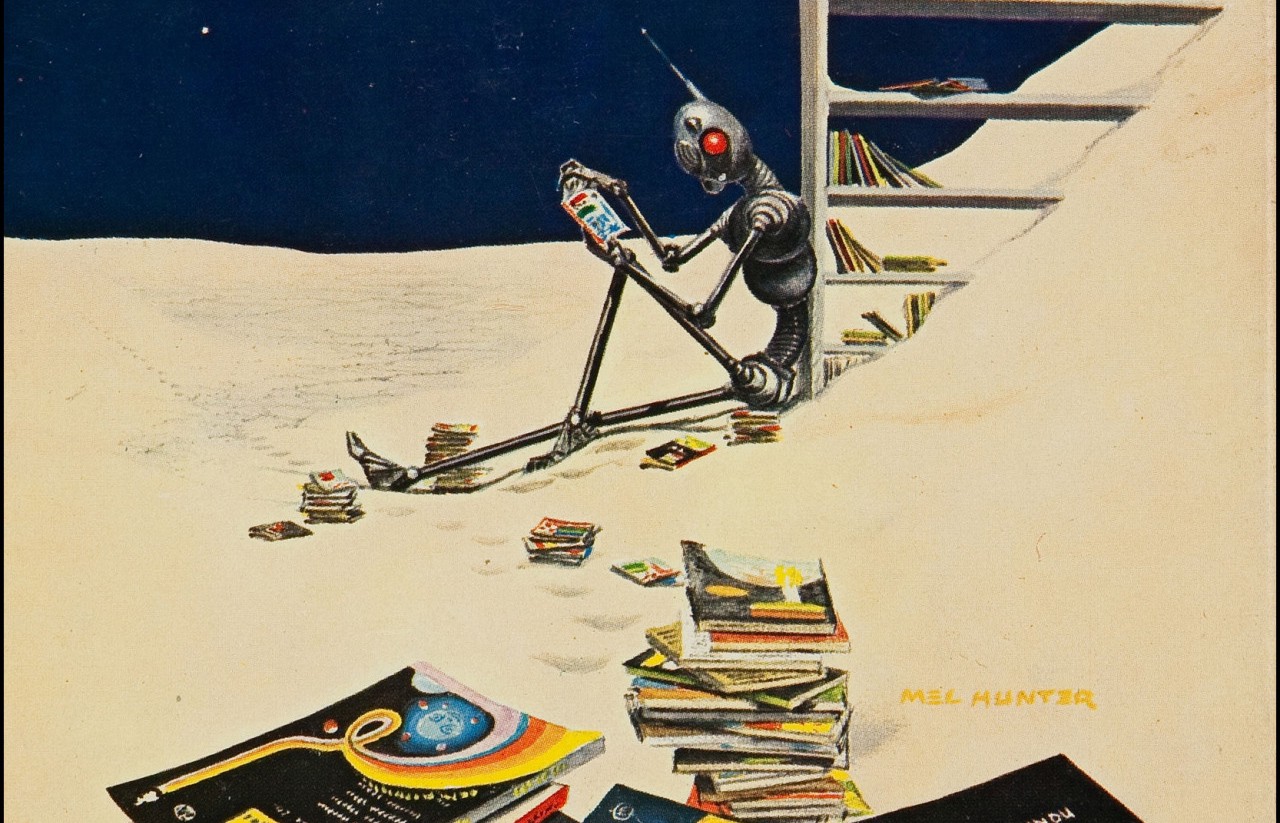Books & Culture
Oh, Slippery Slipstream: Who Is the Weirdest Genre of Them All?

Recently, a Wall Street Journal article titled “Slipstream Fiction Goes Mainstream” trumpeted, once again, the triumph of genre-bending writing’s apparent coup at overthrowing the supposed realism gods of the literary mainstream. The proof seems to be Kelly Link’s (excellent!) new collection of stories Get in Trouble getting a higher print run than her old books. Certainly, hurrah for Kelly Link — who is one of the best and most inventive writers in any genre — and definitely, hurrah for her writing reaching more people! But is “slipstream” really the newest way that genre-ish lit is breaking boundaries? Or, perhaps more urgently, why is the traditional media always firmly planted at the beginning of the genre conversation?
While the WSJ article certainly reads as a positive reportage of what is presented to be a developing literary phenomenon, there’s still the sense that the article itself is preceding from a pessimistic or at least partially biased lens. The authors of the WSJ piece define “slipstream” fiction as being “the new weird” because it “borrows” from science fiction, fantasy or horror, to “surprise” readers who aren’t expecting such things in their allegedly normal fiction. The way this piece makes it sound is that “slipstream fiction” is like reading a kitchen-sink drama only to have robots, ghosts, or fairies bust down the door screaming “nobody expected us to come into this story!” like the Spanish Inquisition in that old Monty Python sketch.
I find this to be a tiny bit reductive and disingenuous for a few reasons. For one, the “definition” of slipstream seems to have been almost arbitrarily assigned sans its original context. Innocently or not, this term originates with author Bruce Sterling, who, writing in SF Eye #5 in 1989 wondered about a word which might define a genre (or “category”) that wasn’t quite for hardcore SF readers, but might be too odd for mainstream readers, too. Context of this essay is relevant, because Sterling arrived at his defining of “slipstream” out of what seemed to be his personal frustration with the SF establishment. From the essay in which “slipstream” was coined:
“Science Fiction — much like that other former Vanguard of Progressive Mankind, the Communist Party — has lost touch with its cultural reasons for being. Instead, SF has become a self-perpetuating commercial power-structure, which happens to be in possession of a traditional national territory: a portion of bookstore rackspace.”
Sterling went on to say that writers from the mainstream (in and around 1989) were doing SF better than SF. Generally, his argument seems to go something like this: Toni Morrison’s Beloved was a better ghost book than any other ghost book in 1987, but wasn’t nominated for genre awards and it should have been. Or, Kurt Vonnegut’s Galapagos had just as interesting far-future Earth in 1985 than say, William Gibson’s Neuromancer, though SF readers didn’t pay much attention to Vonnegut at that time. Now, whether you agree with this line of reasoning in 1989 or 2015 isn’t my point here (really), my point here is that Sterling was seemingly mad at the SF establishment and really excited about “mainstream” lit that was doing cool SF-esque things. All of this is super-interesting to keep in mind when you think about where the word “slipstream” supposedly originates. Sterling seems to suggest that he thinks a “genre” has power, while a “category” is simply a marketing term. Notably, in 1989, Sterling believed the “mainstream” would never refer to itself as mainstream. So, he coined “slipstream,” — a sort of in-between kind of fiction — which Sterling says was represented by a bunch of specific authors of which he provides a list. Ironically or not, a lot of them (like Kurt Vonnegut) are authors that people like me continue to wonder about in almost exactly the same way Sterling did back in 1989. Is Kurt Vonnegut sci-fi or not? The debate is endless and I could have it with you right now and we’d end up in a slumber party that lasted for about six months. So, various writers and critics (myself very guilty) seem to continuously have this sort of genre discussion about all sorts of writers from Karen Russell to Etgar Keret and where the supposed genre membranes do or do not exist. But the conversation is complex and ongoing. My feeling about it lately is that it all seems like a game of impossible ratios. Hmmm, let’s see, if a story has two parts monster but one part “regularness” then it’s probably “slipstream.” But if that ratio favors more “regularness” and the monster just waves in the background (and/or is maybe not “real”) then it’s just normal plain old literature.
But let’s get “real.” If Orbit Books or Del Rey published a novel featuring NO science fiction of fantasy elements, the readers might be confused, but there probably wouldn’t be many think pieces claiming “domestic realism is the hot new SF trend!” in conventional media outlets. However, the reverse is always true: when a mainstream publisher “slums it” with some fantasy elements, it’s made to seem like we’re experiencing a “trend.”
In reality, all of this simply connected to the reputation of a publisher/magazine has and not the quality of the fiction itself. We expect Orbit to publish science fiction and fantasy, because they are a science fiction and fantasy publisher. But if there’s a monster or ghost in a book put out by Knopf, suddenly it’s an eyebrow raising event. Don’t these expectations seem a little silly? This doesn’t happen in television, really, at all. Sci-fi TV shows aren’t limited to existing on the SyFy Channel. There aren’t movie theatres that only show science fiction and others that only show “regular” movies. But publishing is different. A wonderful author named Paul Park has been publishing fiction which could be defined as “slipstream” for decades and is certainly in the same meta-fictional literary neighborhood as Borgess (notably last year’s All Those Vanished Engines), but because his publisher has primarily been Tor Books (full disclosure I kinda worked there) he’s thought of as a “science fiction writer.”
The WSJ piece outright acknowledges this publishing reality in its quoting of FSG editor Sean Macdonald in which he admits to intentionally not marketing Jeff VanderMeer’s Southern Reach trilogy as “science fiction,” in an attempt to reach a larger audience. This to me, makes sense in terms of making smart publishing decisions. We all have to eat, and in order to sell more books, you might not want the baggage of being called a “science fiction writer.” I get it. In fact I’m for that kind of marketing. But is coming up with a newish media label (“slipstream”) that much better for the health of books and reading in general? I’m not blaming FSG or Bruce Sterling or the WSJ. I’m blaming everyone who has a bias about science fiction and fantasy, positive or negative, which is, actually, everyone. Myself included. Because the paradigm of how we think about this stuff needs to change too, not just the labels.
About a decade after Bruce Sterling’s “slipstream” essay, in 1998, Jonathan Lethem wrote an essay called “The Squandered Promise of Science Fiction.” In it, he asserted that in 1973 had Thomas Pynchon’s Gravity’s Rainbow beat Arthur C. Clarke’s Rendezvous with Rama for the Nebula Award, that science fiction and the mainstream would have more or less coalesced, at least in the critical sense. From Lethem’s piece:
“Pynchon’s nomination now stands as a hidden tombstone marking the death of the hope that science fiction was about to merge with the mainstream.”
I know Lethem has said a lot of different things since then (and I’m sure I’ll say different things about genre many times before the end of this calendar year) but it’s still an interesting sign-post, if not tombstone. The SF community (as represented by the Hugo Awards and the Nebula Awards) both has and hasn’t acknowledged the mainstream since that point. In 2001, Michael Chabon’s The Amazing Adventures of Kavalier and Clay won both the Pulitzer Prize AND The Hugo Award for best novel. Michael Chabon also won a Nebula in 2007 for his alternate universe novel The Yiddish Policeman’s Union. In the present decade however, the Hugos and Nebulas ignored Gary Shteyngart’s Super Sad True Love Story, Karen Russell’s Swamplandia!, Alean Graedon’s The Word Exchange, Karen Thompson Walker’s The Age of Miracles, and Victor LaValle’s Big Machine. (The the latter was The LA Times’s “Best Science Fiction Novel” of 2009.)
What about “the mainstream?” Have The National Book Awards or The Pulitzer Prize nominated any works of science fiction or fantasy? If we use the “slipstream” definition, then the answer is yes. Because George Saunders has been nominated for the National Book Award and so has Tea Obreht. But if we use the more conventional definitions of SF (as defined by publishing borders) then we discover that though the NBA awarded Ursula K. Le Guin with a lifetime achievement award last year, it’s not like the National Book Award has this giant track record in recognizing SF writers. Yes, LeGuin won a NBA in 1973 (for Young People’s Literature) but that’s not exactly the same. So, in terms of an open-mined view of literature as a whole — despite some omissions — the SF community seems a little less snobby than the lit community.
Still, you could interpret all of my brief awards analysis in the positive: things are changing. And maybe in these big generalizations, I’m paradoxically splitting hairs. Because anecdotally I’ve found everyone is more open-minded than all that. Personally, over the past six years or so, I’ve had a lot of discussions with all sorts of folks on this subject and the overall feeling seems to be that the “mainstream” is open to genre conventions and the “genre” gate keepers have always liked literary voice-driven stuff. Case in point: Jo Walton’s 2011 novel Among Others is a quasi-memoir/quasi-science fiction/fantasy novel published by an SF publisher (Tor.) Lit snobs who love “voice” and “beautiful sentences” can dig it and SF fans who love big ideas and talking about SF can (and do) love it, too. Meaning, what the WSJ article gets wrong about all this is oddly also what it gets right. The focus and search for new labels actually proves how meaningless they’re becoming. We live in a world where Kareem Abdul Jabbar is writing a book about Sherlock Holmes’s brother and we all hardly bat an eye. If you’ve written a bestselling YA novel that doesn’t take place in a futuristic dystopia, people are surprised. With the exception of Titanic, the top 20 highest grossing films OF ALL TIME are science fiction or fantasy to some degree. Surely, in this day and age, the mainstream press can come up with a slightly less gee-wiz affect when writing about writing that is supposedly “weird.” Is it all that “weird” to write about supernatural occurrences? I hear that the first super-popular book in the western world features dudes who can turn into burning bushes. Historically, “weirdness” has always been hip.
Obviously, terms like science fiction and slipstream are helpful short hands for discussing tastes and differences and so forth. Ditching one term for the other one is a smart commercial move and probably one I’d make, too. (Sorry sci-fi!) I’m not claiming slipstream doesn’t exist or the genre of science fiction is a mass hallucination perpetrated by the Hugo judging committee. But, I am saying, that it might be fun to imagine those two hyperboles as a progressive thought experiment for clearing or realigning some of your biases. Imagine there’s no genres; I wonder if you can?
Because the flipside of some of these labels is they seem born about of a desire to be disassociated with a sense of “otherness.” Oh, I don’t write fantasy, I write “slipstream.” In making the newer term hip the old term becomes dirty. This happened in 1951 with “science fiction,” too when Robert Heinlein suggested that he was more interested in writing “speculative fiction.” Samuel R. Delany responded to this in an essay called “Quarks” in 1969 in which he said:
“Speculative fiction? It is one of the numerous terms that numerous critics for numerous reasons have decided is inadequate for the numerous things that fall under it.”
My take away from this is that the “speculative fiction” label didn’t change anybody’s biases. Which is what I mean about the mainstream media being at the beginning of the conversation. Talking about slipstream is a good step to bringing out biases shared by readers and critics on all sides, but just slapping a label on something doesn’t actually confront those biases effectively. The only way to really combat those biases is to change reading expectations all together. Of course Kelly Link and Jeff VanderMeer can appeal to “the mainstream.” Being surprised is silly. But we also shouldn’t be surprised if someone who mostly reads Star Trek novels also digs The Corrections. Science fiction and fantasy readers aren’t “weirdoes” and literary readers don’t become “weird” by reading fiction with supposed weirdness. We know young adult novels are also read by old adults, so why is there an insistence or at least an implication that science fiction books are written and read by space aliens?(Or even if they were, what’s wrong with being a space alien?) I’m friends with folks who have written Star Trek novels and episodes of the various TV shows. They like the Beatles. They know a lot of Richard Brautigan. I might be having a totally unfair reaction to the word “weird,” but it seems pejorative. Is Weird Al “weird?” You get it.
Three years ago, I wrote about a novelist friend of mine asking me “Why does it matter? Why can’t science fiction and fantasy writers just do their thing and shut up about genre definitions? ” The answer to her question is: we (the SF community) really should shut up and just read outside of our genre more. Just because Jonathan Lethem “left” SF doesn’t mean SF readers who loved Gun With Occasional Music should stop reading his other books. Meanwhile we (the literary mainstream) should stop pretending like Lethem’s first novel was Motherless Brooklyn, and by extension, should also stop pretending like stuff that’s not that weird, is weird. To me, the discussion about why readers are or are not willing to accept “realism” versus “non-realism” has almost nothing to do with labels (genres, marketing terms, categories, whatever) but instead is about the actually newer trend of reader sharing; the idea that there don’t have to be niche reading demographics if the people putting out the books decide not to think of books in those terms. “These books” (whatever they are) can be for “everyone.” Which I think is what is great about what MacDonald at FSG did with The Southern Reach Trilogy.
I’m in the SF community (I write about science fiction all the damn time), but I’m also in the mainstream literary community.(The parties are good and I live in New York City.) And from where I sit, the right reason to support “slipstream” isn’t because the geeks or winning or anything like that or because sci-fi is now a dirty, dirty thing. But instead, because writing in general is gradually becoming less cliquish in all camps. Which is why the existence of the WSJ slipstream article is, in a sense, great.
The future of reading sharing is one I believe where genre labels and buzzwords exert less influence. Instead, this future can and should be lousy with something everyone involved definitely possesses: enthusiasm for books they love.









